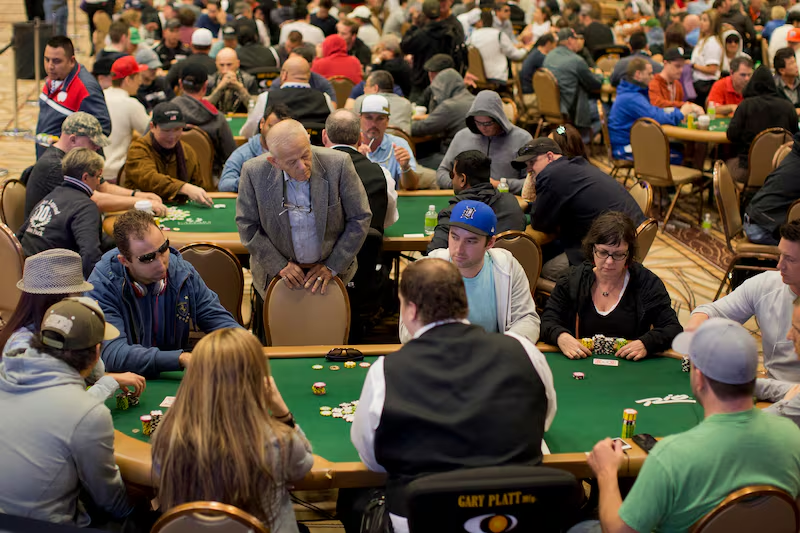A year ago this week, the Jackson Five saved my life at a Las Vegas casino.

OK, unless you’re a fellow poker nerd, don’t take me too literally.
But my own impossible story, of a middle-aged amateur winning big on the green felt of Sin City, may help explain why thousands of my fellow wannabes are flocking to the 44th annual World Series of Poker this weekend for its globally celebrated main event.
It’s also why millions more will be tuning in to ESPN to watch the only “sport” in which an unpracticed, out-of-shape math geek can compete on the game’s biggest stage with the world’s preeminent professionals.
Like many men my age, I’ve always been fascinated with poker. Never an exceptional athlete, poker presented me a unique opportunity to leverage my theretofore un-hip math skills in a competition that oozes of machismo and swagger. In pop culture, poker is played in rustic saloons by pistol-wielding studs named “Tex” and “Slim”; in the real world, it presents an ideal boys’ night of whiskey swigging, cigar chewing, and even a little extra-cash-winning.
But competing for big money? Flicks like Rounders and The Cincinnati Kid taught that those contests were the province of practiced professionals, wiseguys, cheaters, and almost as often the unsuspecting novice “fish” who were swallowed by the poker sharks at their tables.
By 2003, however, that perception was spun on its head by a young Tennessee amateur—he of the pot belly, disarming drawl, and the improbable name of Chris Moneymaker—who entered the World Series of Poker main event through a $39 satellite tournament and took home the championship bracelet and $2.5 million prize. ESPN and other networks seized upon Moneymaker’s everyman persona and unlikely success, and helped thrust the legendary game into the pop-culture zeitgeist.
The main-event phenomenon peaked in 2006, when brash, bespectacled Hollywood agent Jamie Gold (what’s with these last names?) bested more than 8,700 opponents to win a record $12 million. But last year’s event (PDF) was no slouch either, with nearly 75,000 entrants chasing a $222 million prize pool in 61 events.
I was among the masses, eager to check off an item high on my bucket list. As a fully recovering politician, no longer concerned that my partisan opponents would label me a gambling man in a Bible Belt state, I put down my $1,000 entry fee and joined 4,820 other dreamers in the WSOP’s four-day no-limit Texas Hold ’Em tournament.
What was most remarkable about my first table was how much it was unlike anything I had seen on TV. While ESPN employs elaborate sets, snazzy editing, and colorful commentators to build suspense, animation, and tension, the overwhelming sensation of the event’s early stages is mind-numbing, soul-crushing boredom.
The cavernous Rio Casino’s poker room—the tournament was moved there in 2005 from the old-Vegas Binion’s Horseshoe—seems like Bizarro Vegas, bearing an uncanny resemblance to a sterile sweatshop warehouse. For 12 hours a day, men and women sit shoulder to shoulder, hunched over tables lit in cool fluorescent hanging from unadorned scaffolding, many wearing headphones to drown out the omnipresent, cricketlike drone of the nervous shuffling of poker chips, interrupted occasionally by shouts of “Table open!” the poker equivalent of “Man down!”
Tedium, indeed, is the great equalizer. For those of us novices not steeped in the science of divining an opponent’s hand through body language and facial expression, we’re forced to master the arts of discipline and endurance. Sure, many a player is knocked out because of bad luck, but often a trip to the rail is preceded by failure of attention or an emotional overreaction to a bad beat or a series of poor hands. It’s the Protestant Work Ethic writ large: long days and nights honoring the timeless virtues of diligence, money management, and most of all patience.
By midnight of Day 2, I was running on Diet Coke fumes but had far surpassed any of my original goals. Fewer than 100 of us remained sitting, all guaranteed to at least triple our investment.
With my chip stack in free fall, I was forced to go all-in with a hand composed of a jack and a five. The “Jackson Five” does not live up to its boy-band namesake: It’s truly mediocre—much more Tito than Michael. But the poker gods were smiling, and I was called by an even weaker opponent. I doubled up my chips, my execution briefly stayed.
I looked down at my next hand and tried not to smile. It was a pair of sevens. Pretty good, akin perhaps to a ’70s Lynyrd Skynyrd or an ’80s Duran Duran. I knew it was time, finally, to leverage the table image I’d been carefully cultivating: the jovial tourist/rube, dressed in ball cap and team uniform. I dramatically pushed all-in—usually when someone acts strong, their cards are weak—and was called by someone who’d measured me impetuous. I doubled up again.
Stacking my mess of chips, I looked down a third time and saw two kings ... two majestic kings. The second-best hand in Hold ’Em: if aces are the Beatles, then kings are surely the Stones. All-in. This time I got two calls from folks who probably thought I was acting the reckless bully. Less than an hour later, I went to bed—for a fitful, caffeine-disrupted, so-called sleep—among the tournament’s chip leaders.
I’d never have that kind of run again, but for the next 15 hours of play, I hung in and reached the celebrated final table, ultimately finishing in eighth and winning nearly $70,000.
I’d love to think I was some sort of poker savant, discovering in midlife a talent that measured among the global elite. But what my example really proved is that the recipe for poker championships requires above-average math and people skills, the diligent application of timeless virtues, and a whole lot of well-timed luck.
And that’s why a sedentary, often wearisome card game continues to capture the public imagination. In a culture marked by growing inequalities, where it often appears that no amount of hard work or virtuous behavior can empower you to overcome your circumstances, it is a centuries-old pastime that gives everyone—even us average schmoes who’d never dream of being on an ESPN stage—a real chance to enjoy a moment of sublime transcendence.






